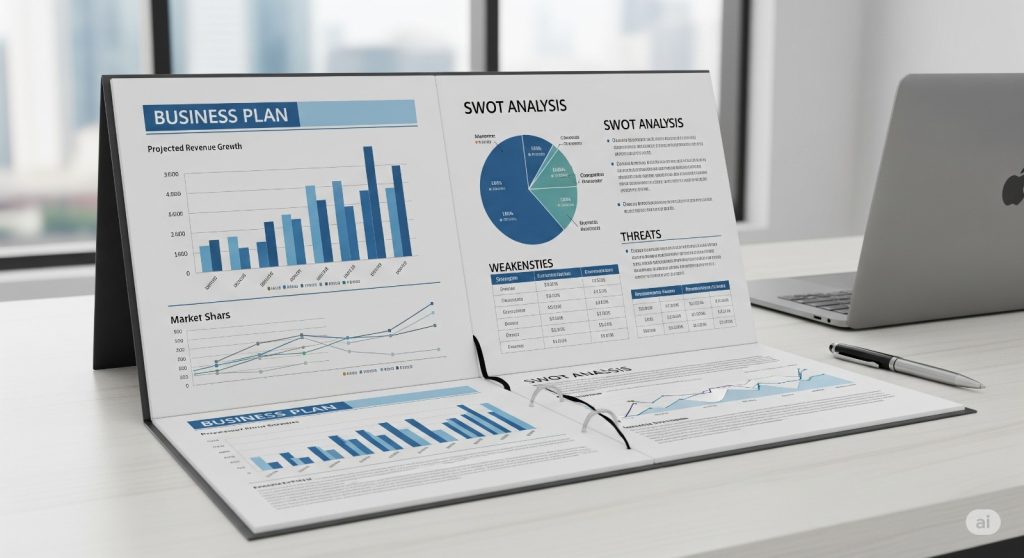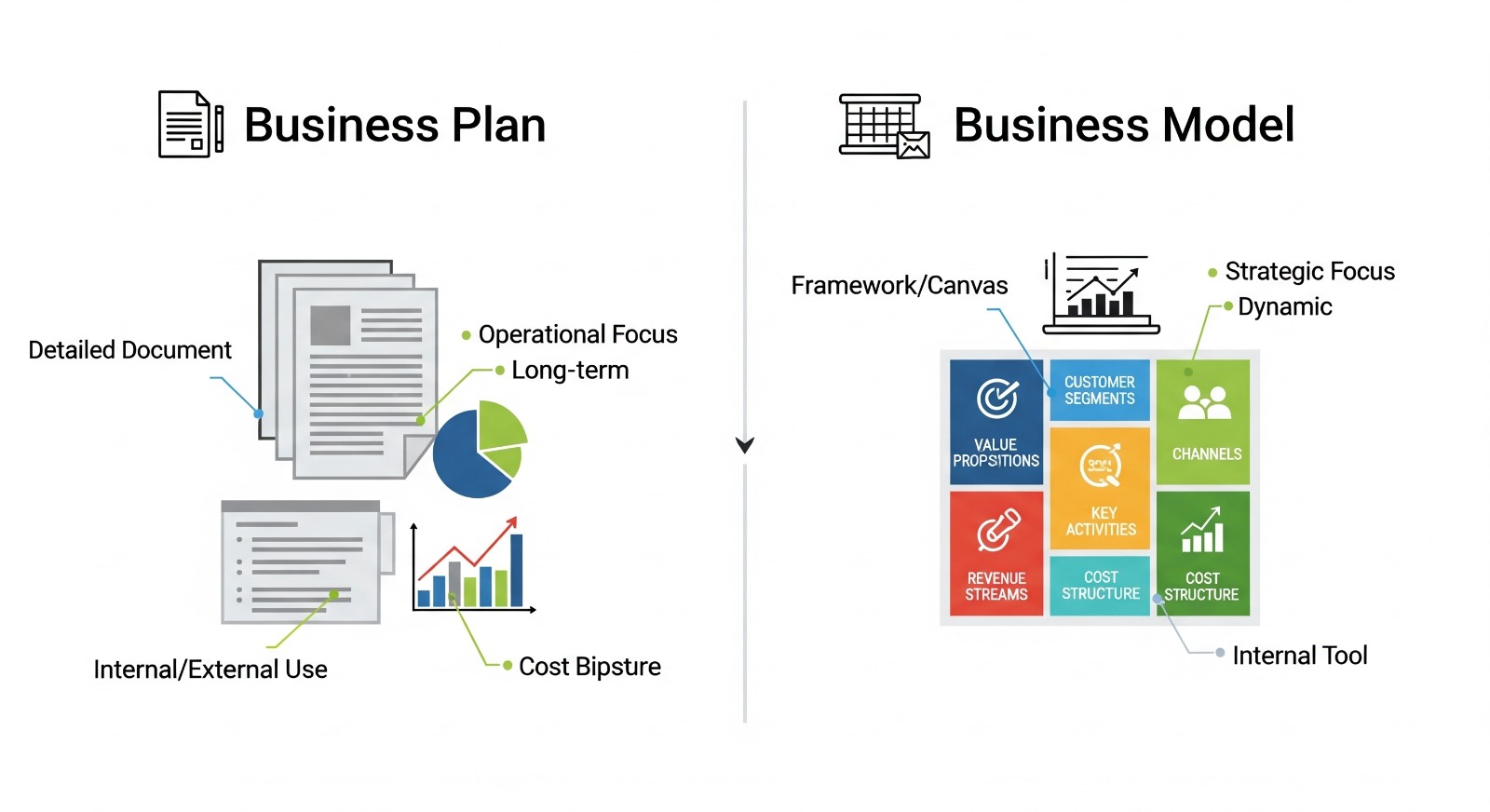Congratulations, anxious founder! If you’ve landed here, it’s because some business “expert” (probably your cousin with a minor in TikTok dances) dropped “business plan” and “business model” in the same sentence and you nodded, pretending not to panic. Is there a difference? Is one more important? Will either save you from your existential startup dread, or at least provide a compelling reason to drink yet another iced espresso? Buckle up, disruptor-wannabe—let’s break down the actual difference in real, human language, with less MBA fluff and more “my Wi-Fi just dropped” honesty.
Section 1: The Ancient Mystery of the Business Plan (a.k.a. Corporate Fan Fiction)
Let’s start with everyone’s favorite grownup homework: the business plan. You know, that Google Doc you half-heartedly started at 1 AM, right after deciding on your company’s “vibe” and playlist.
Here’s what a business plan actually is:
- A long, intimidating document filled with hopes, dreams, charts, and buzzwords like “synergy” and “leverage”—because plain language is for peasants.
- A desperate attempt to convince banks, investors, and yourself that you know what you’re doing.
- A dazzling tombstone for your time; the only thing scarier than taxes or an empty Starbucks Rewards balance.
Pro tip: Your business plan should at least sound like you have a plan, even if your “operations strategy” is just “pray nothing breaks during the grand opening.”
Think of it like a novel where, instead of fun characters, you showcase how many times you can use the word “projections.” And yes, nobody reads past the executive summary except maybe your mom—she loves you, bless her heart.

Section 2: The Business Model—Your Get Rich (or Hopeful) Scheme, Explained
And then there’s the business model. If the business plan is the 30-page essay, the business model is the notecard you wrote in homeroom after procrastinating all semester.
What a business model REALLY is:
- The “How Do We Make Money?” diagram you scribble on a napkin at Dennys.
- The honest answer to, “So, why doesn’t this fail immediately?”
- The engine of your operation, not the whole car manual.
Translation:
- It’s the “how,” not the “what.”
- If you run a dog-walking startup, the business plan is the pitch you give your aunt on why you’ll be a millionaire. The business model is, “People pay me $15 to walk their dog. I pay a teen $10 to walk it for me. Everyone’s happy—except, maybe, the dog.”
List of common business models, because you will absolutely pretend you “invented” one of these:
- Subscription (think Netflix but for socks, plants, or artisanal beef jerky)
- Freemium (give it away, then nickel-and-dime for features)
- Direct sales (honestly, Etsy shop + Craigslist hustle)
- Marketplace (Uber but for x, literally every pitch since 2015)
Side note: The business model is what lets you survive long enough to update your business plan with even bigger lies about your revenue projections.

Section 3: Why People Get These Mixed Up (and Who’s to Blame)
Alright, let’s get painfully real: everyone confuses these terms. Is it because no one taught entrepreneurship in high school? Maybe. Or is it because startup gurus on YouTube love making everything sound complicated so they can sell you a $499 “clarity course”? Yes. Yes, it is.
- A [business plan] is the WHAT, the script, the detailed explanation—the screenplay of your business movie.
- The business model is the plot twist—the actual reason money moves and you stay in business after launch day.
Still confused? Imagine if Netflix’s business model was: “Charge people monthly for endless TV and hope they never unsubscribe.” Their business plan is 80 pages explaining who watches what, why original content is expensive, and how Ted Lasso fixes everything.
Checklist for new entrepreneurs, because lists = dopamine:
- Have a business model? Great! Write it down.
- Know your business plan? Awesome! Hope you enjoy your 58th version.
- Can you pitch both in 30 seconds at Thanksgiving while Great Aunt Sharon pours more wine? If not, practice harder.
Fact: You can have a business model without a business plan. That’s called “winging it.” You can also have a business plan without a business model. That’s called “a bad time.”
Section 4: Which Do You Actually Need? (Spoiler: Both, But Don’t Panic)
Let’s get you off the fence and onto the hustle. Do you really need both? In America, technically no. In the real world, absolutely yes—unless you enjoy living off pity and Hot Pockets.
- Launching a hobby hustle? Start with a business model. “How do I get paid?”
- Ready to impress a bank, investor, or your own anxiety? Business plan, baby! (But only after nailing the model.)
If you ever hope to:
- Raise cash from someone not obligated by blood,
- Prove you’re not the same as every other “side hustle boss” on Instagram,
- Or simply organize your own thoughts—
…then create both. But don’t treat your [business plan] like gospel. Update it when things (inevitably) go sideways, and remember: a business model that works is worth more than a business plan no one reads.
Final survival hack: If you ever feel like screaming into the void, remember, even Jeff Bezos started with a business model (“Sell stuff online, slowly take over the world”)—he just eventually wrote the business plan so investors would stop laughing while they wrote him checks.
Conclusion: TL;DR for the Attention-Impaired
So there you have it:
- Business model = your money-making game plan
- Business plan = your elaborate, overly formatted pitch deck on why millions WILL definitely flow your way
You now officially know more than most LinkedIn “influencers.” If anyone asks you the difference, just smirk, pour yourself another coffee, and say, “It’s all in the model, baby—it always is.”
If you read to the end, reward yourself: print this out, tape it to your laptop, and pretend you’ve got it all figured out. Because in today’s world, confidence is really the only business model that never fails.
